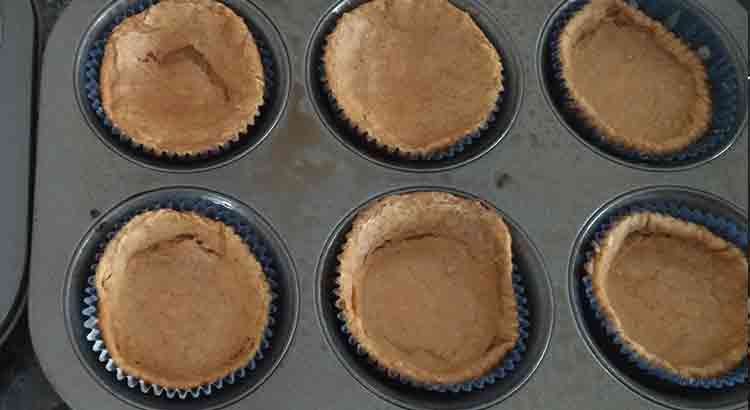Who doesn’t love a warm and delicious muffin fresh out of the oven? But there’s nothing more disappointing than biting into a muffin that’s flat and dense. If your muffins aren’t rising properly, don’t worry – it’s a common problem that can be easily fixed!
One of the most common problems that make muffins come out of the oven flat is not mixing the batter properly. Both undermixing and overmixing the dough will affect the gluten network which is responsible for the structure of the muffin, and the result will be a flat muffin.
Whether you’re a beginner or an experienced baker, these tips and techniques will help you troubleshoot any issues you may be having with your muffins. So, grab your apron and let’s get baking!
1. Overmixing
One of the most common reasons why your muffins are flat is overmixing the batter. When you overmix the batter, you develop the gluten in the flour, which results in tough and dense muffins. To prevent overmixing, you should mix the batter until it’s just combined. You can do this by using a wooden spoon or rubber spatula and gently folding the ingredients together. If you’re using an electric mixer, make sure to mix on low speed and stop as soon as the ingredients are combined.
Another tip to prevent overmixing is to mix the wet and dry ingredients separately before combining them. This way, you can ensure that each ingredient is evenly distributed and avoid overmixing the batter when you combine them. Also, remember to add any mix-ins, such as fruit or chocolate chips, at the very end and only fold them in gently.
2. Undermixing
On the other hand, undermixing the batter can also result in flat muffins. When you undermix, the ingredients are not evenly distributed, and you may end up with pockets of flour or baking powder in the batter, which can cause uneven rising. To avoid undermixing, make sure to mix the ingredients until they’re just combined, with no lumps or dry spots.
Another tip is to use room temperature ingredients, as they will mix together more easily. If your ingredients are cold, such as butter or eggs, they can clump together and not mix in properly. So, make sure to take the ingredients out of the fridge a few hours before baking to bring them to room temperature. Finally, remember to measure your ingredients accurately, as too little or too much of certain ingredients can also affect the rise and texture of your muffins.
3. Too Much Sugar
Another reason why your muffins may be flat is that you’re using too much sugar in the batter. While sugar adds sweetness and flavor to your muffins, too much of it can weigh down the batter and prevent it from rising properly. To avoid this, make sure to measure your sugar accurately and use only the amount specified in the recipe.
You can also experiment with using alternative sweeteners, such as honey or maple syrup, which are less dense than sugar and may help your muffins rise more easily. Finally, try using less sugar in your mix-ins, such as chocolate chips or dried fruit, as they also contribute to the overall sweetness of the muffins.
4. Not Enough Leavening Agent
If your muffins are consistently flat, you may not be using enough leavening agent in the batter. Leavening agents, such as baking powder and baking soda, help the muffins rise and become light and fluffy. If you don’t use enough, your muffins may not rise enough and end up flat.
To ensure that you’re using enough leavening agent, make sure to measure it accurately and use the amount specified in the recipe. Also, make sure that your baking powder and baking soda are fresh and haven’t expired, as old leavening agents may not work as well. Finally, remember that baking soda needs an acid to activate, so make sure to include an acidic ingredient, such as buttermilk or yogurt, in the recipe.
5. Too Much Liquid
If your muffin batter is too runny or thin, it may be because you’re using too much liquid. Excess liquid can weigh down the batter and prevent it from rising properly, resulting in flat muffins. To avoid this, make sure to measure your liquid ingredients accurately and use only the amount specified in the recipe.
If you’re using fresh fruit in your muffins, remember that they contain a lot of moisture, which can also contribute to excess liquid in the batter. To avoid this, make sure to drain any excess liquid from the fruit before adding it to the batter. Additionally, you can try using dried fruit or reducing the amount of liquid in the recipe to compensate for the added moisture from fresh fruit.
6. Not Preheating the Oven
One of the most important steps in baking muffins (and any other baked goods) is preheating the oven. If you don’t preheat the oven, your muffins may not rise properly and end up flat. This is because the high heat of the oven helps the leavening agents activate and create steam, which causes the muffins to rise.
To ensure that your muffins bake properly, make sure to preheat your oven for at least 10-15 minutes before baking. This will ensure that the oven is at the correct temperature and ready to bake your muffins. Also, make sure to use an oven thermometer to check that the temperature is accurate, as oven temperatures can vary.
7. Opening the Oven Door During Baking
Another common mistake that can result in flat muffins is opening the oven door during baking. When you open the oven door, you let out heat and disrupt the temperature inside the oven, which can cause the muffins to sink and become dense.
To avoid this, resist the urge to open the oven door during baking, especially in the first 10-15 minutes of baking when the muffins are rising the most. If you need to check on the muffins, use the oven light and look through the oven window instead. Also, make sure to rotate the muffin tin halfway through baking to ensure even baking and rising.
Final Thoughts
There are several reasons why your muffins may be flat and not rising properly. However, with a few simple adjustments, you can ensure that your muffins turn out light, fluffy, and perfectly risen every time.
Remember to measure your ingredients accurately, use fresh leavening agents, and avoid overmixing or undermixing the batter. Also, make sure to preheat your oven and resist the urge to open the oven door during baking. By following these tips and techniques, you can bake muffins that will impress your friends and family!
Finally, don’t be discouraged if your first attempts at baking muffins are not perfect. Baking is a skill that takes practice and patience to master. Keep experimenting with different recipes and techniques, and don’t be afraid to make mistakes. With time and practice, you’ll be able to bake muffins that are perfectly risen, moist, and delicious every time. Good luck and happy baking!

